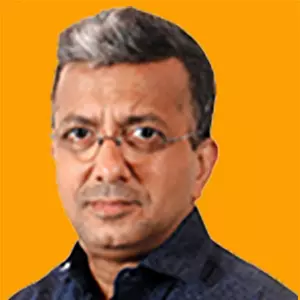
- Home
- India
- World
- Premium
- THE FEDERAL SPECIAL
- Analysis
- States
- Perspective
- Videos
- Sports
- Education
- Entertainment
- Elections
- Features
- Health
- Business
- Series
- In memoriam: Sheikh Mujibur Rahman
- Bishnoi's Men
- NEET TANGLE
- Economy Series
- Earth Day
- Kashmir’s Frozen Turbulence
- India@75
- The legend of Ramjanmabhoomi
- Liberalisation@30
- How to tame a dragon
- Celebrating biodiversity
- Farm Matters
- 50 days of solitude
- Bringing Migrants Home
- Budget 2020
- Jharkhand Votes
- The Federal Investigates
- The Federal Impact
- Vanishing Sand
- Gandhi @ 150
- Andhra Today
- Field report
- Operation Gulmarg
- Pandemic @1 Mn in India
- The Federal Year-End
- The Zero Year
- Science
- Brand studio
- Newsletter
- Elections 2024
- Events
- Home
- IndiaIndia
- World
- Analysis
- StatesStates
- PerspectivePerspective
- VideosVideos
- Sports
- Education
- Entertainment
- ElectionsElections
- Features
- Health
- BusinessBusiness
- Premium
- Loading...
Premium - Events

No matter how popular or famous any journalist is, the fact remains that they are mere pawns in the hands of those who own the outlets – be it a television channel, newspaper, or magazine.
Now that the dust has settled and the din over the boycott of 14 television anchors by the INDIA alliance has considerably quietened down, it is possibly time to delve into what the measure has achieved.
If you ask me, it has achieved nothing. Period.
For one, the bellicose anchors have shown no contrition. Nurtured and nourished in their narcissist bubble, none have expressed any remorse. Rather, they have sought to revel in the boycott’s aftermath, both defending and doubling up in doing what they do. They are continuing to unapologetically train their guns on only those in Opposition and loudly amplify what the party in power wants them to propagate.
Selective outrage
They remain steadfastly shameless in their selective outrage. Take, for instance when BJP MP Ramesh Bidhuri recently spewed venom against a fellow Muslim parliamentarian. Most chose to ignore the vitriol and Bidhuri generally got a free pass in prime-time shows in sharp contrast to the time when Rahul Gandhi was roasted for the ‘flying kiss’ that he had reportedly blown across the parliament aisle. There has been no let-up in the double standards that deliver debilitating blows to the very edifice of journalism.
That the boycott has failed to chastise the anchors is a no-brainer. They are incentivized not to fall in line. Patronised by profit-seeking owners signing their fat paychecks, they bask in their notoriety. Some among their misguided audience even adore them, guaranteeing better TRPs. The business model of the channels that employ the anchors flourishes only when journalism is buried deeper.
But why blame the anchors? Instead, blame the boycotters for barking up the wrong tree.
Mere pawns
I agree there is a great deal of disagreement still about whether the boycott was right or wrong. I, for one, remain against it despite some forceful arguments to the contrary by some celebrated journalists such as Ravish Kumar. Even public intellectuals such as Yogendra Yadav have strongly batted for the boycott, terming it more as a ‘moral weapon’ against the willful spreading of hate, bigotry, and fake news. While the objective and purpose cannot be disputed, I do still disagree with the method adopted. Blacklisting people, as The Indian Express said, cannot and should not have a place in any decent democracy. Any such measure opens the path to more such pitfalls for press freedom in the future.
My argument is simple: while toxicity in public discourse cannot be condoned, merely boycotting anchors does not serve the larger purpose of rescuing debates, discussions, and narratives from the depths they have currently sunk to. For the recalcitrant news presenters are just the symptoms and not the disease behind the downward spiral. The real villains are the ones who pull the strings from behind and pay the anchors to mouth their daily inanities.
Come to think of it, the anchors are doing what the media owners want them to do. No matter how popular or famous any journalist is, the fact remains that they are mere pawns in the hands of those who own the outlets – be it a television channel, newspaper, or magazine. The power and influence that any mainstream journalist wield is directly proportionate to what his or her owner permits. The moment the owner pulls the plug, an average journalist turns into a paper tiger. There could be some exceptions to this – Ravish being one with millions of online followers. But it generally holds true for most others, including lesser mortals like me. It is very likely that most of the boycotted anchors without much credible journalism to show would significantly lose traction if their owners were to show them the door.
Sparing owners
That the boycott has not come to bite yet is primarily because it spared the owners. It is also uncertain whether such a step would force the owners to mend their ways. They will never heed the message that any boycott intends to serve as long as the potential to reap profits in a marketplace where hate and bigotry sells remain secure. Make no mistake. The anchors are mere puppets. If the need be, they can be easily replaced with other motormouths who then will continue to do the bidding of their masters.
A far better option to inflict shame and drive some sense into those who have strayed so grotesquely from the course could possibly be collective non-cooperation. For the moment, it makes no sense for leaders of the Opposition alliance to boycott some anchors but participate in other programmes of the same television channels that so religiously manufacture the madness that has come to settle over the country.
In some way or the other, we all have been culpable to varying degrees in contributing to propaganda. Though some conscientious individuals do stay away from some of the most notorious channels, an overwhelming majority amongst us are still driven by the overpowering desire to be featured on TV or to see our name in print in publications that have long ceased to speak truth to power and have all but become propaganda tools.
It is upon each one of us to ensure that we do not enable propaganda – with or without a public announcement. Not cooperating with the offending media outlets at individual levels needs to become a mass movement. It is only then that the bad apples in the media would possibly find themselves delegitimized, perhaps to a far greater degree than what a surgical strike such as the selective boycott seeks to achieve.
(The writer is the former Group editor-in-chief of Outlook and author of ‘Editor Missing: The Media in Today’s India’)
(The Federal seeks to present views and opinions from all sides of the spectrum. The information, ideas or opinions in the articles are of the author and do not necessarily reflect the views of The Federal)


